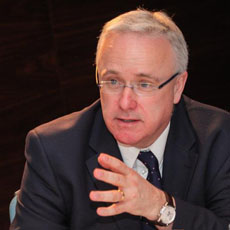For Catholics, the idea of an “oath for all holders of public office”, which the communities minister Sajid Javid proposed yesterday, has unpleasant connotations. For most of the last 500 years, Catholics were forced onto the margins of society by such measures as the oath of royal supremacy and the Test Act.
Still, we do not yet know what exact shape the oath would take. The idea was first suggested by Louise Casey’s new report on integration. She proposed two oaths: one as a condition of entry to the UK, and another as a requirement for holding public office. This was worrying because Casey’s “British Values” set a high bar of required conformity to social liberalism in general, and maintained a strong focus on sexuality in particular. Her oath would put many religions’ employment contracts and codes of conduct – and especially those of Catholic schools and evangelical charities like Tearfund – on the wrong side of the law, as well as excluding some from public appointments.
Writing at the weekend, however, Sajid Javid, Secretary for Communities, suggested that any oath for public office holders would be broader than Casey had hinted. His focus was on the value of democracy, the rule of law, and participation as well as equality. One imagines that after consultation something workable for all communities could be secured.
In any case, an oath is unlikely to solve our problems of integration on its own. Nor are as many of the suggestions in the Casey Review as one would have hoped – so it is a good thing that the government has so far reacted to it cautiously.
Casey’s report throws up a diamond every now and then, but overall it lacks a coherent narrative or cogent analysis of its copious data-sets. It misses many of the ways in which we can build community cohesion and counter Islamist extremism, not least because its recommendations do not always flow from its content.
When it comes to resisting extremism, her chief concern is areas with high concentrations of Pakistani and Bangladeshi Muslim immigrants, and these areas’ capacity to drive disaffection and division. This reads like a return to New Labour funding principles, which literally correlated Muslim headcount with Muslim threat of violence. Consequently, Casey understates the decentralisation of ISIS’s evil strategies through the use of social media and the consequent experience of cities beyond the English North, such as Portsmouth, where former employees of its own police force have travelled to join Daesh’s genocidal cadres. The situation we face now is far more complex than anything with which Labour had to grapple.
A less media-conscious, more pragmatic report could have said more about the range of community institutions that could be called to assist, and examined more creatively the surprising, innovative ways in which community cohesion is being fostered already. Take Wetherspoon’s: my own research begins to suggest that many of the pub chain’s branches provide more day care, affordable food, company and support for poor white men, isolated elders and single mums than any number of churches, mosques or even foodbanks – and often with more dignity. (The role of Wetherspoon’s in so many local communities helps to explain why the chain’s owner Tim Martin supported Brexit.)
Casey could also have examined innovations which have not reached for new government cash as their first port of call. The All-Party Parliamentary Group on Faith In Society, led by Stephen Timms MP, has developed a cross-party “covenant” between local authorities and religious groups, covering millions of voters, to make standards of participation and funding transparent. Birmingham University and City Lit College have hosted Muslim community days out, cross-community volunteering, and a Mental Wealth Festival aimed at those with learning disabilities to drive inclusion. There are 30,000 Muslim students in Catholic schools, more that could be welcomed in additional free schools, and more still in those of the Church of England. Next summer St Mary’s University in Twickenham will open a ‘summer university’ for looked-after children.
Fortunately, the government has a richer view than Casey’s report alone embodies. Sajid Javid’s article moved the Casey discussion on from her tenor of blame to a new articulation of integration being a ‘two way street’. This reciprocal tone is matched by the conscientious efforts of Junior Minister Lord Bourne who has been visiting projects nationwide including those run by the Caritas Social Action network.
The ministers’ new integration unit leader, who is soon to be appointed, ought to be immediately given serious political cover and a blank but collaborative canvas to invent. The skills and analysis to protect our most vulnerable communities from the anguish that extremism and isolation can unleash will require both political support and creative thinking. An oath on its own won’t solve these problems – and badly designed it could even make them worse

Davis, Francis. (2016, December 19). A ‘British Values’ oath has worrying echoes. There are much better ways to boost integration [Blog post]. Retrieved from http://www.catholicherald.co.uk/commentandblogs/2016/10/31/expect-some-religion-friendly-reforms-from-theresa-may-and-her-gifted-advisors/A ‘British Values’ oath has worrying echoes. There are much better ways to boost integration
